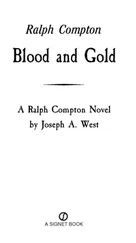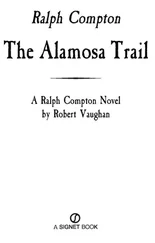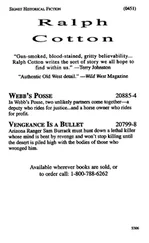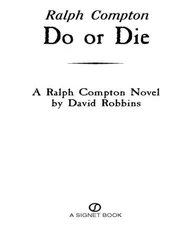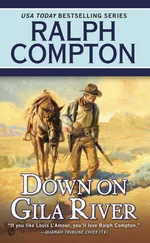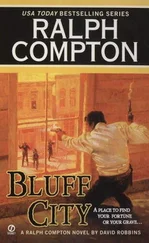“I’m not the law, if that’s what’s botherin’ you,” Dan said.
“Haw, haw,” one of the men cackled. “Would you admit it if you was?”
“I have nothing to hide,” said Dan. “I didn’t cotton to the war, and I laid out up in St. Joe, Missouri. But I got lonesome for Texas, and that’s where I’m headed.”
To further his bluff, Dan holstered the Colt he still held in his hand.
“I’m Bart Scovill,” the lead rider said, “and I’ve always had a hankerin’ for a chestnut mare just like that one of yours.”
“Good luck finding one,” said Dan.
While Scovill had been talking, two of the mounted men had sidestepped their horses so that they had a clear shot, and it was these men Daniel Strange was watching. When they went for their guns, Dan drew with lightning swiftness and shot them both out of their saddles. But the other mounted men were firing now, and a slug ripped into Daniel Strange’s shoulder, slamming him to the ground. Four of them were on him before he was able to move.
“Jasper,” said Scovill, “tie a good thirteen-knot noose. Rufe, bring me that chestnut mare that this pilgrim’s willing to die for.”
“Take the horse,” Dan Strange said desperately. “Let me go.”
“A mite late for that,” said Scovill. “You gunned down Reece Quay and Corbin Rucker, and the Good Book says an eye for an eye. They was my friends.”
Ruse had saddled the chestnut mare, leading it to where Dan lay on the ground.
“Byler,” Scovill said, “search him. He might have enough on him to buy all of us a drink or two.”
Dan fought his way loose and was on his knees when Byler slugged him with the heavy muzzle of a Colt. The outlaws shouted in glee when Byler took the sheaf of bills from Dan’s old wallet.
“Here,” said Scovill. “Gimme that for safekeeping. Get him in his saddle. We’ll string him up, take his horse, and ride.”
Byler hoisted Dan Strange into his saddle, leading the chestnut mare to a giant oak. The noose was placed around Dan’s neck, and the loose end of the rope flung over a limb. Bart Scovill slapped the flank of the chestnut, and the mare broke into a gallop, leaving the unconscious Daniel Strange dangling at the end of a rope. The outlaws were watching in morbid fascination, and nobody remembered the mare until the animal had a good head start.
“Damn it,” Scovill shouted, “some of you catch that mare.”
But the chestnut mare didn’t like these men, and riderless, the animal lit out in a fast gallop toward home. The pursuing outlaws were quickly left behind. Finally, they gave up the search and returned to join their comrades. Dan Strange’s dead body turned slowly, one way and then the other, in the light breeze from the west. Byler still held the empty wallet, and he flung it to the ground beneath the dangling corpse. The remaining ten outlaws didn’t even bury Quay and Rucker, but mounted their horses and rode south.
Indian Territory. April 15, 1870.
Deputy U.S. Marshal Buck Jordan smelled the stench before he came upon the grisly mass of flesh hanging from an oak limb. His horse snorted, back-stepping, and Jordan led the skittish animal well away from the scene of death. He tied his bandana over his nose and mouth and started back toward the hanging tree. That’s when he saw what remained of the pair of outlaws Daniel Strange had shot.
“My God,” said the lawman aloud, “the buzzards and coyotes have already got too much of you gents, they might as well have the rest.”
Jordan cut the rope, easing Daniel Strange’s body to the ground, and that’s when he saw the empty wallet. He opened it and found a card that read Daniel Strange, Gunsmith, St. Joseph, Missouri.
“Well, old son,” Jordan said to the lifeless man, “the bastards took everything but your shirt, britches, and boots. All I can do is bury you and try to get word to your next of kin.”
Jordan carried a small folding spade behind his saddle for just such a need as this, and he buried Daniel Strange beneath the oak where he had died. Jordan then studied the sign left by the riders.
“Twelve horses left here, but two saddles were empty,” Jordan said aloud. “That was good shootin’, Daniel Strange. A damn shame there had to be so many of them, but it’s the way of yellow coyotes to travel in packs.”
Fort Smith, Arkansas. April 17, 1870.
Buck Jordan turned in his report to his superior and, having no better address, sent the empty wallet to the Family of Daniel Strange, Gunsmith, St. Joe, Missouri . With it he enclosed a letter explaining the circumstances and signed his name.
St. Joseph, Missouri. April 20, 1870 .
It was already dark outside when the chestnut mare reached her home corral. Gaunt and trail-weary, she nickered.
“That’s Sundown!” Danielle cried
“Oh, dear God,” said Margaret Strange, “some thing’s happened to Daniel.”
“Maybe not,” Danielle said. “I’ll get a lantern.”
Trailed by Margaret, Jed, Tim, and Danielle hurried to the corral. The mare nickered again, for she was among friends.
“She’s stepped on the reins and broken them,” said Danielle. “She’s come a long way, riderless.”
“Pa’s hurt somewhere,” Tim said. “We got to go find him.”
“No,” said Margaret, biting her lip to hold back the tears. “Your father’s dead.”
“I’ll ride into town tomorrow,” Danielle said, “and see if there’s anything the sheriff can do.”
It was a long, miserable night during which none of them slept. Danielle was ready to ride at dawn.
“Why is she ridin’ in to talk to the sheriff?” Tim cried. “It ought to be Jed or me. This is man’s work, and she’s just a . . . a girl.”
“Stop botherin’ Ma,” shouted Danielle. “Can’t you see she’s sick?”
Margaret Strange was ill with grief and worry. Upon reaching town, Danielle went first to Dr. Soble’s office and told him the circumstances.
“I’ll prescribe a sedative and look in on her,” the physician promised.
Danielle then went to the sheriff’s office, and he confirmed her fears.
“This parcel came yesterday,” Sheriff Connally said. “It has no address except St. Joe, and the postmaster give it to me to deliver. He reckoned it might be important.”
Danielle ripped away the brown paper, revealing her father’s old wallet. She collapsed in a ladder-back chair, weeping. Sheriff Connally gathered up the brown paper wrapping, which still contained the letter from Deputy U.S. Marshal Buck Jordan. Swiftly he read it, waiting for Danielle to compose herself. When she had, the old sheriff handed her the brief letter. As Danielle read the letter from Buck Jordan, her tears were replaced with fury.
“The low-down, murdering bastards!” she shouted. “There must be something we can do to make them pay.”
“Now, girl,” Sheriff Connally soothed, “it happened in Indian Territory. It’s plumb full of thieves and killers, and there’s no way of finding the varmints, even if we knowed who they are.”
“There must be some way to find them, to make them pay,” cried Danielle.
“Danielle,” the old sheriff said, “your daddy’s gone. There’s nothing you can do that’ll change that. Now don’t go off and do somethin’ foolish.”
Danielle knew if the sheriff had any idea of the thirst for vengeance that possessed her, he would somehow foil the plan that was taking shape in her mind.
“I won’t do anything foolish, Sheriff,” said Danielle. “Thank you for your concern.”
She mounted the chestnut mare and rode away. Connally watched her go. Despite her suddenly mild demeanor, he suspected trouble. He sighed. The girl was ready to raise hell and kick a chunk under it, and there was nothing he could do.
Читать дальше

